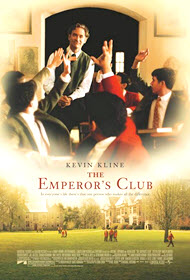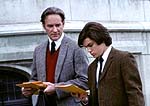The Emperor's Club
 for some language and sexuality.
for some language and sexuality.
Reviewed by: Ken James
CONTRIBUTOR
| Moral Rating: | Better than Average |
| Moviemaking Quality: |
|
| Primary Audience: | Teens Adults |
| Genre: | Drama |
| Length: | 1 hr. 49 min. |
| Year of Release: | 2002 |
| USA Release: |



Striving to make a difference in other people’s lives
Does character matter in political leaders?
What’s so dangerous about situation ethics?

Are we living in a moral Stone Age?
Is the religion of Secular Humanism being taught in public school classrooms?
| Featuring |
|---|
| Kevin Kline, Emile Hirsch, Embeth Davidtz, Joel Gretsch, Rob Morrow |
| Director |
|
Michael Hoffman |
| Producer |
| Andrew Karsch, Marc Abraham |
| Distributor |
“In everyone’s life there’s that one person who makes all the difference.”
What do Enron, Martha Stuart, Worldcom, and Bill Clinton (or just about any political figure) have in common? No, it’s not the latest crude joke (at least, not to my knowledge). It’s just a simple observation of our culture: we’ve got a major problem with ethics and integrity.
It’s easy to blame others, so let’s get closer to home. Did you know that 91 out of 100 of you reading this right now lies on a regular basis? 18 of you 91 lie daily. 64% will “lie when it suits me, so long as it doesn’t cause any real damage.” 30% of adults will cheat on their taxes. [Source: The Day America Told the Truth, James Patterson, Peter Kim]
The Emperor’s Club couldn’t come at a more appropriate time. Starring the masterful Kevin Kline as William Hundert, a dedicated teacher of the Classics at St. Benedict’s preparatory boys school, we have here a story that spans a quarter of a century. Though it can be likened to “Dead Poets Society” only in that it takes place at an elite boarding school, it is a total contrast in the overall message. Whereas the Latin phrase “Carpe Diem” became commonplace after the 1989 feature, The Emperor’s Club reminds its viewer that it’s not just one mistake that determines our future. In most cases, it is rather a series of continual choices made over time that molds and makes the man.
In this case, that man is Sedgewick Bell (Emile Hirsch, “The Dangerous Lives of Altar Boys”), a bright and privileged Senator’s son who finds acting out the part of class clown and rule breaker more attractive than attentive student. While Emile (pronounced Em-eel) may be relatively unknown, it is certain he’ll find plenty of roles after his excellent performance in The Emperor’s Club. Going toe-to-toe with the Academy Award Winning Kline, Emile and his character Sedgewick couldn’t be more opposite. Emile says “let’s see, we’re both human, but other than that, I don’t think there’s any relationship to him for me! But I do think anyone can kind of relate to him not wanting to lose. No one wants to lose. It’s just how certain people handle it. He handles it in a way of someone that can’t lose and won’t lose.” His character is willing to win at any cost. This story breaks the myth that cheaters don’t win. Sometimes it seems that they DO win, DO get ahead. (Ever read the Psalms?) Yet at what cost to their soul… or to others mowed down in the process?
When Sedgewick enters the school, the other students are immediately drawn to his magnetic personality. It’s in part exactly that magnetism that makes Mr. Hundert know he must confront Sedgewick’s rudeness and lack of respect for any authority. During the semester Hundert offers a bit of a truce and the two develop a mutual respect. Though Hundert is a man of ethics and morality, he finds himself breaking some of those rules here and there for Sedgewick. A generation later, Mr. Hundert, Sedgewick and his former classmates gather for a reunion… but it’s an uncomfortable one at best. Has Sedgewick changed for the better in the past 25 years? Mr. Hundert comes to face the generation-old choices he has been haunted by.
If you think you can already guess how it ends, with the teacher redeeming the student or vice versa, you’d be wrong. One of the interesting things about this story (based on the short story by Ethan Canin entitled “The Palace Thief”) is that there is no redemptiveness. There is no preaching. The Emperor’s Club simply raises questions about situational ethics, morality, and right and wrong. It’s the perfect film for teachers, students, and parents who wish to start discussions that can influence one another for good.

Wanna know more about this film? Read our interviews with actors Kevin Kline, Emile Hirsch, Rob Morrow; Director Michael Hoffman and Producer Marc Abraham; and writers Neil Tolkin and Ethan Canin
Shot for a mere $14 million (mere by industry standards) The Emperor’s Club is a marvelous piece. Each of the cast and crew members I spoke with talked of the passion that brought everyone together to help see this project to completion. It’s that kind of passion that can be felt here. It’s technically terrific, with strong acting from each of the characters. Kline is famous for saying it all with his eyes, and here we find no exception. There are a few instances of foul language (mostly coming from Sedgewick’s Senator father, and later from an adult Sedgewick). There is also a scene in the first 20 minutes that shows some of the contraband that Sedgewick brings to school, including a girlie mag with a topless woman on it. Keeping in mind the MPA rating (PG-13), I find The Emperor’s Club a strong pick with something to offer for those of any age over 13. My recommendation is that audiences mix it up a bit so that young and older can view the film together with a point of discussing it afterwards. A film like this isn’t for mere entertainment only…


That is why he changed his grade. This is a type of “rescuing” and we see it happen all the time. They don’t have to experience consequences for their actions. But we, the viewer, gets to see the consequences of even that kind of thinking in this movie. Hundert said “I failed him as a teacher.” He didn’t show him the character he needed to show him. If he had challenged him in the contest at the time it happened, perhaps the outcome would have been different.
It fails in character from the headmaster as well. He seemed to be interested only in the money Sedgewick’s dad could give to the school. It’s become too acceptable, so who is going to stand up and be HONEST? The redeeming value in the film is that we get to see how these character flaws affect our society in the end.
[Average / 4]
[Average / 4]
[Good / 4]
[Better than Average / 4]
DISCUSSION: 1. In a day when ethics are lacking in so many political leaders we’ve experienced the damaging impacts. Discuss what the effects are if a senator, like Bell, has no moral commitment. What will this do to the Senate? What will this do to the people in his state? What will this do to his son? How can we tell whether the rhetoric is just a spin to get elected or a true, life commitment?
2. The temptation to help those who need help often pulls us to step on those who are doing well. Discuss how the decision of Mr. Hundert to help Sedgewick could have been done without stepping on Martin Blythe (Paul Franklin). Explore how Martin bringing his son to Mr. Hundert’s class was an act of forgiveness and trust. Discuss whether this was an even more empowering experience for both Martin and Mr. Hundert as they faced the betrayal which occurred years earlier.
3. Set within a Christian prep school of St. Benedict’s, discuss why you think Jesus and his ethical teachings of the Sermon on the Mount were not mentioned. Why were the Greeks and their culture the identity of the ethical teaching of the film? What would have been different if Jesus had been the focus of Mr. Hundert’s teaching on character?
4.Was it unjust of the board to not make Mr. Hundert head of the school? Was such a promotion a match for his gifts and interests? Is longevity the best or primary ingredient for advancement?
At some point we must give them over to God in prayer and focus our energy on those who are willing to be molded into people of integrity. Sedgewick Bell, the boy who became the successful executive, seemed proud of his lack of scruples. Someday we will all have to look at ourselves as God sees us. Oftentimes the innocence of a child who looks up to us will cause us to reflect and realize we are not worthy of their respect. And, I pray this will lead to repentance and new life.
[Better than Average / 4½]
This point is revealed in the third act of the movie. Kevin Kline does an outstanding job with most of the heavy lifting in this story. Many critics have compared this film to “Mr. Holland’s Opus.” I would contrast it with Tom Hanks role in “The Castaway.”
Mr. Kline’s character is symbolically stranded on an island containing the ideas of truth and integrity. These are the values that we long to see in politics and business, but we are losing ground Our media is so starved to sniff out the latest scandal, while many silent unnoticed heroes enrich our lives every day. It is most unfortunate that this film has been a holiday release. I hope that it will get some well deserved “Oscar” buzz. The cold hard facts are that it will be eclipsed by Harry Potter and “The Lord of the Rings.”
Even the Hollywood press junket coverage slighted this film and its potential influence is already fading. “Hot Ticket” (for example) left this film off of their weekend review and focused instead on George Clooney’s upcoming release and a special on movies with shocking sexual material. That should not stop you from creating your own “buzz”—I know I will!
[Better than Average / 4]
[Good / 5]

My Ratings: [Excellent! / 4]